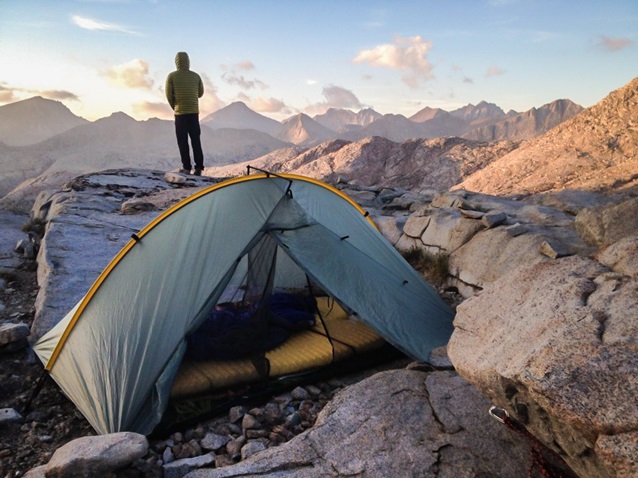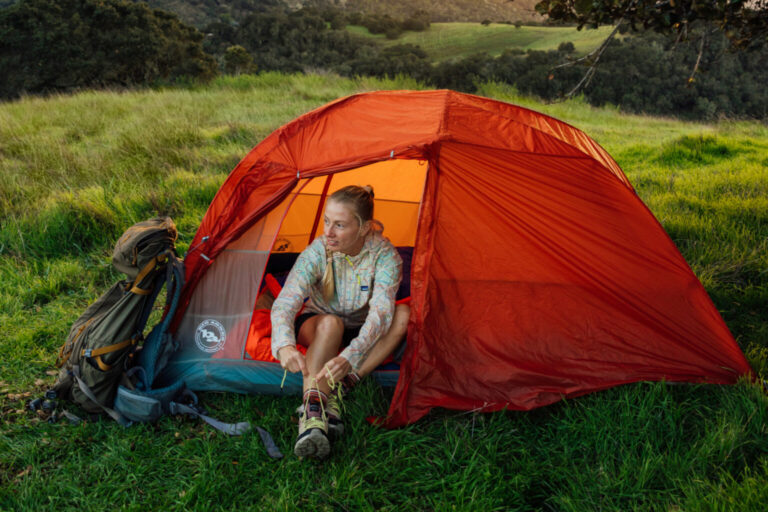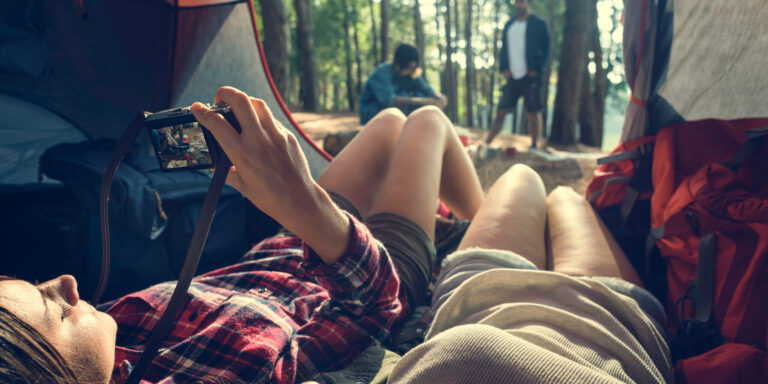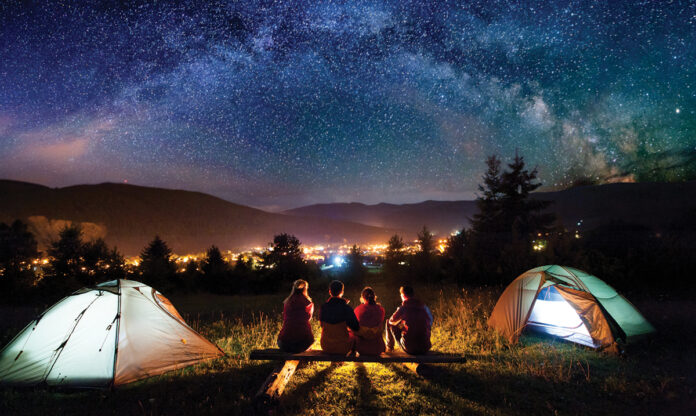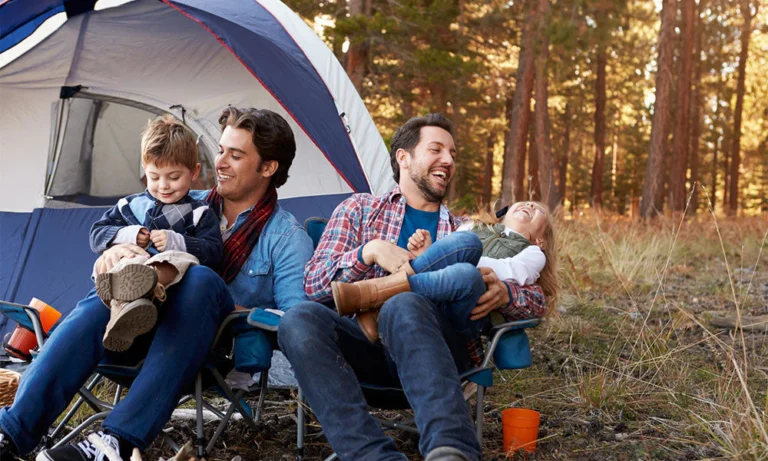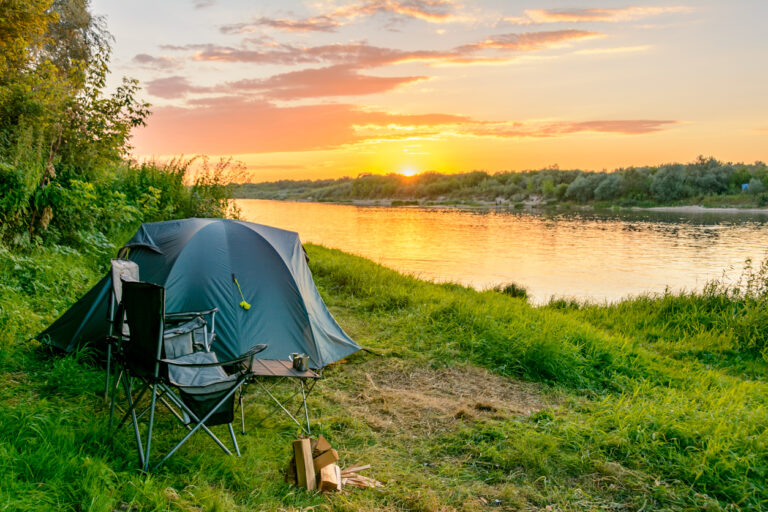The Full Camping Equipment Checklist: A Basic Guide for Any Outdoor Experience.
One of the greatest ways to relax from the stresses of everyday life, reconnect with nature, and make enduring memories with loved ones is to go camping. Having the appropriate gear can mean the difference between an enjoyable adventure and a frustrating ordeal, whether you’re planning a longer expedition or going on a weekend getaway. The essentials for any outdoor experience are covered in this comprehensive camping equipment checklist.
1. Shelter and Sleeping Essentials
A good night’s sleep in the outdoors starts with the right shelter and bedding.
- Tent – Choose a tent size that fits your group comfortably. Look for one that’s weather-resistant and easy to set up.
- Tent Footprint or Groundsheet – Protects your tent floor from moisture and wear.
- Sleeping Bag – Select one suitable for the climate; lightweight for summer, insulated for cooler weather.
- Sleeping Pad or Air Mattress – Adds comfort and insulation from the ground.
- Pillows or Travel Cushions – For better sleep support.
- Extra Blankets – Ideal for colder nights or sitting around the campfire.
2. Cooking and Food Supplies
Food is often a highlight of camping, so it’s important to pack everything you’ll need to prepare and enjoy meals.
- Portable Stove or Grill – Gas or wood-based, depending on campsite rules.
- Fuel and Matches/Lighter – Don’t forget spares in case one fails.
- Cookware – Pots, pans, and a kettle for boiling water.
- Utensils – Spatula, tongs, ladle, and knives.
- Plates, Bowls, and Cups – Durable, reusable options are best.
- Cutlery – Forks, spoons, and knives for each camper.
- Cooler and Ice Packs – Keep perishable food fresh.
- Food Storage Containers or Zip Bags – To store leftovers and prevent wildlife encounters.
- Dishwashing Kit – Biodegradable soap, sponge, dish towel, and a basin.
- Trash Bags – Leave no trace by packing out all waste.
3. Clothing and Personal Gear
Dressing properly can keep you comfortable and safe in changing outdoor conditions.
- Weather-Appropriate Clothing – Lightweight for warm days, insulating layers for cold nights.
- Rain Gear – Waterproof jackets, ponchos, or rain pants.
- Hiking Boots or Sturdy Shoes – Provide support on rough terrain.
- Sandals or Camp Shoes – Comfortable for relaxing around camp.
- Socks (extra pairs) – Keep feet dry and warm.
- Hat and Sunglasses – Protect from the sun.
- Gloves and Beanies – Essential in cooler climates.
- Swimwear – If camping near a lake, river, or beach.
4. Safety and Navigation
Being prepared for emergencies is crucial in the outdoors.
- First Aid Kit – Stocked with bandages, antiseptic wipes, pain relievers, and personal medications.
- Navigation Tools – Map, compass, or GPS device.
- Headlamp or Flashlight – With extra batteries.
- Multi-tool or Pocket Knife – For various small tasks.
- Whistle – Useful for signaling in emergencies.
- Fire Extinguisher or Fire Blanket – If allowed and practical.
- Emergency Shelter or Blanket – Lightweight and compact backup.
5. Comfort and Extras
While not strictly essential, these items can make camping more enjoyable.
- Camping Chairs – For relaxing around the fire.
- Portable Table – Useful for food prep and meals.
- Lanterns or String Lights – Create a cozy atmosphere at night.
- Hammock – Perfect for lounging during the day.
- Bug Spray and Citronella Candles – Keep insects away.
- Sunscreen – Essential for skin protection.
- Books, Games, or Cards – Entertainment for downtime.
- Camera or Binoculars – Capture memories and enjoy wildlife.
6. Cleaning and Hygiene
Staying clean and fresh helps make camping comfortable.
- Toiletries – Toothbrush, toothpaste, soap, shampoo.
- Biodegradable Wipes – Quick clean-ups on the go.
- Towel and Washcloth – Quick-dry options are ideal.
- Hand Sanitizer – Convenient when water isn’t available.
- Toilet Paper – Bring extra, just in case.
- Portable Shower or Solar Shower Bag – Optional but refreshing on longer trips.
7. Packing and Organization
Keeping gear organized makes your trip smoother.
- Backpack or Duffel Bag – To carry essentials.
- Storage Bins or Crates – Keep cooking gear and supplies tidy.
- Dry Bags – Protect electronics, clothes, or food from moisture.
- Rope or Paracord – Handy for securing tarps, clotheslines, or gear.
- Carabiners and Clips – Great for hanging and organizing equipment.
Final Tips for a Successful Camping Trip
- Plan Ahead – Research the campsite rules, facilities, and weather.
- Pack Light but Smart – Bring essentials without overloading.
- Practice Setting Up – Try pitching your tent and using equipment at home first.
- Leave No Trace – Respect nature by cleaning up after yourself.
Camping is all about balance—between being prepared and being open to the unexpected joys of nature. With this complete checklist, you’ll be ready for a safe, comfortable, and unforgettable outdoor adventure.

